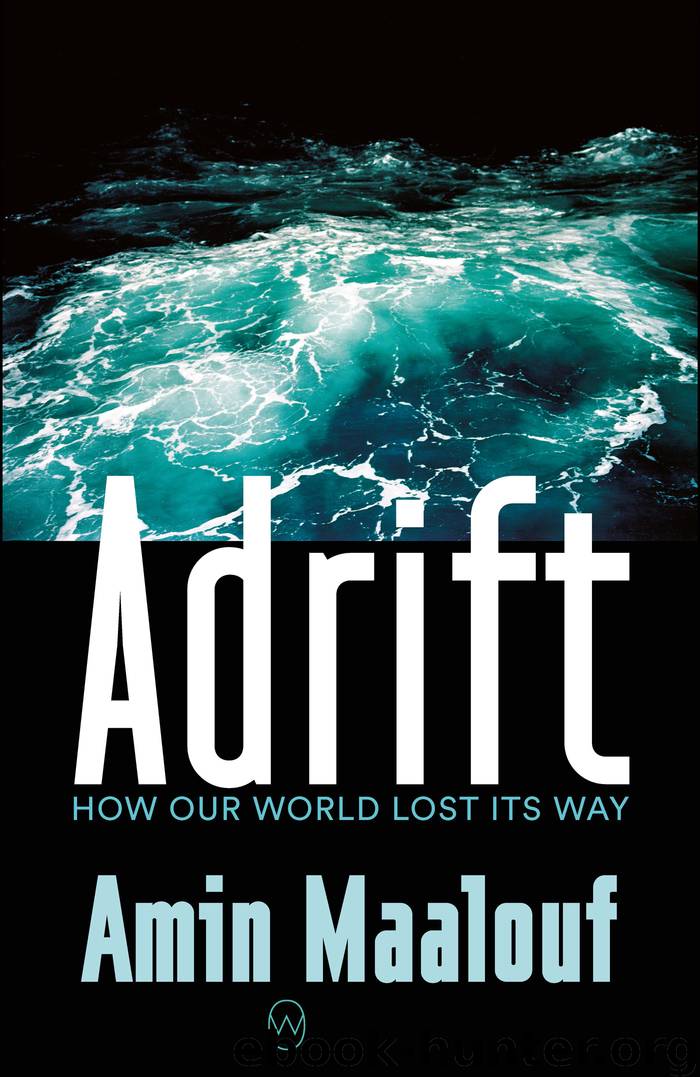Adrift by Amin Maalouf

Author:Amin Maalouf
Language: eng
Format: epub
Publisher: World Editions
Published: 2020-05-13T14:09:03+00:00
-
2
To these two revolutions, which took place within the space of three months and which neatly encapsulate the atypical upheavals of our age, I would add two other events, which are no less significant, and which offer a more complete picture.
In December 1978, at the Third Plenum of the 11th Central Committee Congress of the Communist Party of China, Deng took over the reins of power and launched his own “conservative revolution.” Deng never used this phrase, and it was certainly a very different revolution to those seen in Tehran and London, but it was part of the same zeitgeist. It was conservative in inspiration, since it was a return to the ancient merchant traditions of the Chinese people that Mao Zedong’s revolution had attempted to root out. It was also revolutionary because, in the space of a single generation, it would radically transform life in the largest nation on the planet; in the course of history, few revolutions have so profoundly changed the lives of so many men and women in such a short space of time.
The other notable event took place in Rome, in October 1978, when Pope John Paul II became head of the Catholic Church.
Born in Poland, Karol Wojtyła combined social and doctrinal conservatism with the fighting spirit of a revolutionary leader. “Be not afraid!” he said in his first address to the faithful gathered in St. Peter’s Square on the day of his enthronement. “Open wide the doors for Christ. To his saving power open the boundaries of States, economic and political systems, the vast fields of culture, civilization, and development.” His influence was to prove critical.
Did these four major upheavals, which took place in the seven months between October 1978 and May 1979, in radically different social and cultural settings, have anything in common beyond the mere “coincidence” of their timing? Is it possible that the Roman Curia, the Central Committee of the Communist Party of China, the British electorate, and the Iranian protesters were responding to a similar impulse?
In hindsight, there are two main factors that, to my mind, weighed heavily on the period, which affected every country of the world to varying degrees, and which may have played a role in spurring the four events I have just mentioned. The first is the terminal decline of the Soviet regime; the second is the oil crisis.
The latter I will discuss in greater detail in subsequent chapters; for the moment, let me just say that the oil crisis forced every country on earth to question the management of its economy, its social legislation, and its ties with the oil-exporting countries; meanwhile, for those in the Arab-Muslim world, this “crisis,” which should have ensured their happiness, was to prove devastating and ultimately catastrophic.
As for the decline of the Soviet regime, in hindsight it now seems to me that many of the events of this period were reactions—more or less direct, more or less conscious, more or less considered—to the actions of the “sick man” that the Soviet regime had become.
Download
This site does not store any files on its server. We only index and link to content provided by other sites. Please contact the content providers to delete copyright contents if any and email us, we'll remove relevant links or contents immediately.
| Africa | Americas |
| Arctic & Antarctica | Asia |
| Australia & Oceania | Europe |
| Middle East | Russia |
| United States | World |
| Ancient Civilizations | Military |
| Historical Study & Educational Resources |
The Dawn of Everything by David Graeber & David Wengrow(1707)
The Bomber Mafia by Malcolm Gladwell(1624)
Facing the Mountain by Daniel James Brown(1553)
Submerged Prehistory by Benjamin Jonathan; & Clive Bonsall & Catriona Pickard & Anders Fischer(1455)
Wandering in Strange Lands by Morgan Jerkins(1430)
Tip Top by Bill James(1416)
Driving While Brown: Sheriff Joe Arpaio Versus the Latino Resistance by Terry Greene Sterling & Jude Joffe-Block(1376)
Red Roulette : An Insider's Story of Wealth, Power, Corruption, and Vengeance in Today's China (9781982156176) by Shum Desmond(1359)
Evil Geniuses: The Unmaking of America: A Recent History by Kurt Andersen(1354)
The Way of Fire and Ice: The Living Tradition of Norse Paganism by Ryan Smith(1336)
American Kompromat by Craig Unger(1315)
F*cking History by The Captain(1304)
It Was All a Lie by Stuart Stevens;(1300)
American Dreams by Unknown(1286)
Treasure Islands: Tax Havens and the Men who Stole the World by Nicholas Shaxson(1274)
Evil Geniuses by Kurt Andersen(1257)
White House Inc. by Dan Alexander(1212)
The First Conspiracy by Brad Meltzer & Josh Mensch(1174)
The Fifteen Biggest Lies about the Economy: And Everything Else the Right Doesn't Want You to Know about Taxes, Jobs, and Corporate America by Joshua Holland(1126)
